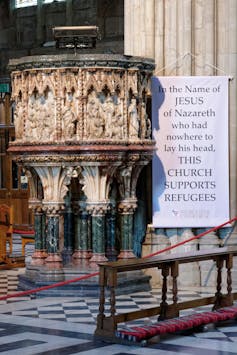Rawpixel.com / Shutterstock
In November, Emad al Swealmeen triggered a bomb outside the Liverpool Women’s Hospital. When it became known that Al Swealmeen was an asylum seeker who had converted to Christianity, it was reported that the Home Office had accused churches of converting asylum seekers to Christianity in order to “game” the asylum system.
In my ongoing research, I explore what counts as a credible conversion to Christianity in asylum processes in Germany and the UK. I have found that in reality, churches and clergy have a very limited role in the asylum process. Rather, it is the role of asylum decision-makers (who work for authorities like the Home Office in the UK) to assess applications on the basis of conversion to Christianity.
I have analysed dozens of asylum decisions of converts to Christianity and case law and observed 32 appeal hearings. I have also conducted 38 formal interviews with judges, asylum applicants, lawyers, pastors and translators as well as many more informal conversations.
The UK and Germany are party to the 1951 Refugee Convention, which (among other things) grants protection to those who would face religious persecution if they returned to their country of origin. Many Muslim asylum seekers who have converted to Christianity would face religious persecution in their home countries.
Assessing an asylum claim based on conversion therefore involves determining what risks an applicant would face on the basis of their faith if they were sent back to their home country. To do this, caseworkers and judges must be convinced that the applicant’s conversion is genuine.
Authorities in a secular state need to assess what beliefs a genuine convert would need to hold, and what practices are essential for a “true Christian”. However, religious conversion is personal and can differ from one person to another. Given that asylum seekers often rely on their word alone to prove their asylum claim, this is a challenging process.
While I have found that assessments can vary from one case to another, converts usually must be baptised and need to demonstrate that they know the “basics” about Christianity. These basics vary, but can include knowledge of Christian festivals, the Bible, prayers or the creed. Applicants may be asked to name a favourite Bible passage to show that the Bible means something to them personally. They must also be able to explain why they converted specifically to Christianity and what triggered their conversion. Importantly, they must show that it is important for their identity to live out their faith openly, for example by proselytising.
My research has shown that asylum decision-makers may be influenced by their culture and socialisation in how they assess these narratives. For example, they may favour a rational and critical engagement with religion rather than supernatural or emotional reasons for conversion. They may also have a particular idea of what Christianity is and may expect answers more typical of liturgical traditions of Christianity, rather than free evangelical traditions.
The church’s role
Churches follow their moral mandate to welcome often destitute asylum seekers. Following the arrival of hundreds of thousands of refugees in Germany in 2015, many clergy reported in interviews that they were surprised by the interest in Christianity. They described how they scrambled to find translators to help those interested in Christianity to understand the church services.

RogerMechan / Shutterstock
If asylum seekers ask for baptism, churches usually offer baptism training and courses about Christianity. Most pastors I interviewed were discerning about who they baptised, and often required a convert to be involved in their church for some time to test their commitment to Christianity. Sometimes a supposed “strategic” conversion turns into a genuine interest in Christianity over time. I observed a number of appeal hearings which happened many years after the initial asylum decision during which an applicant could demonstrate such a faith journey.
Pastors can write letters of support for an asylum application, or accompany a convert to their asylum hearings. However, the final decision regarding the credibility of an asylum seeker’s conversion lies with caseworkers or with judges in appeal hearings.
Determining the credibility of a conversion is an extremely difficult process, with potentially severe consequences for applicants if done wrong. For example, Iranians (who make up a large portion of conversion-based asylum applicants in Germany and the UK) are questioned when they return to their country. They have to sign a document to renounce their conversion to Christianity. If they had previous problems with the Iranian security services, know someone who does, or have attended an underground church in Iran, they could still be persecuted by the state.
My research suggests that the assumption that churches baptise asylum seekers to help with their asylum process is largely false. Most churches are rigorous in discerning who is ready for baptism. Eventually, it is decision-makers of the state who must decide whether a conversion is genuine or not. They would do well to draw more on the expert evidence of clergy who know the asylum applicant and can comment on their religious life.
![]()
Lena Rose receives funding from the Leverhulme Trust.











